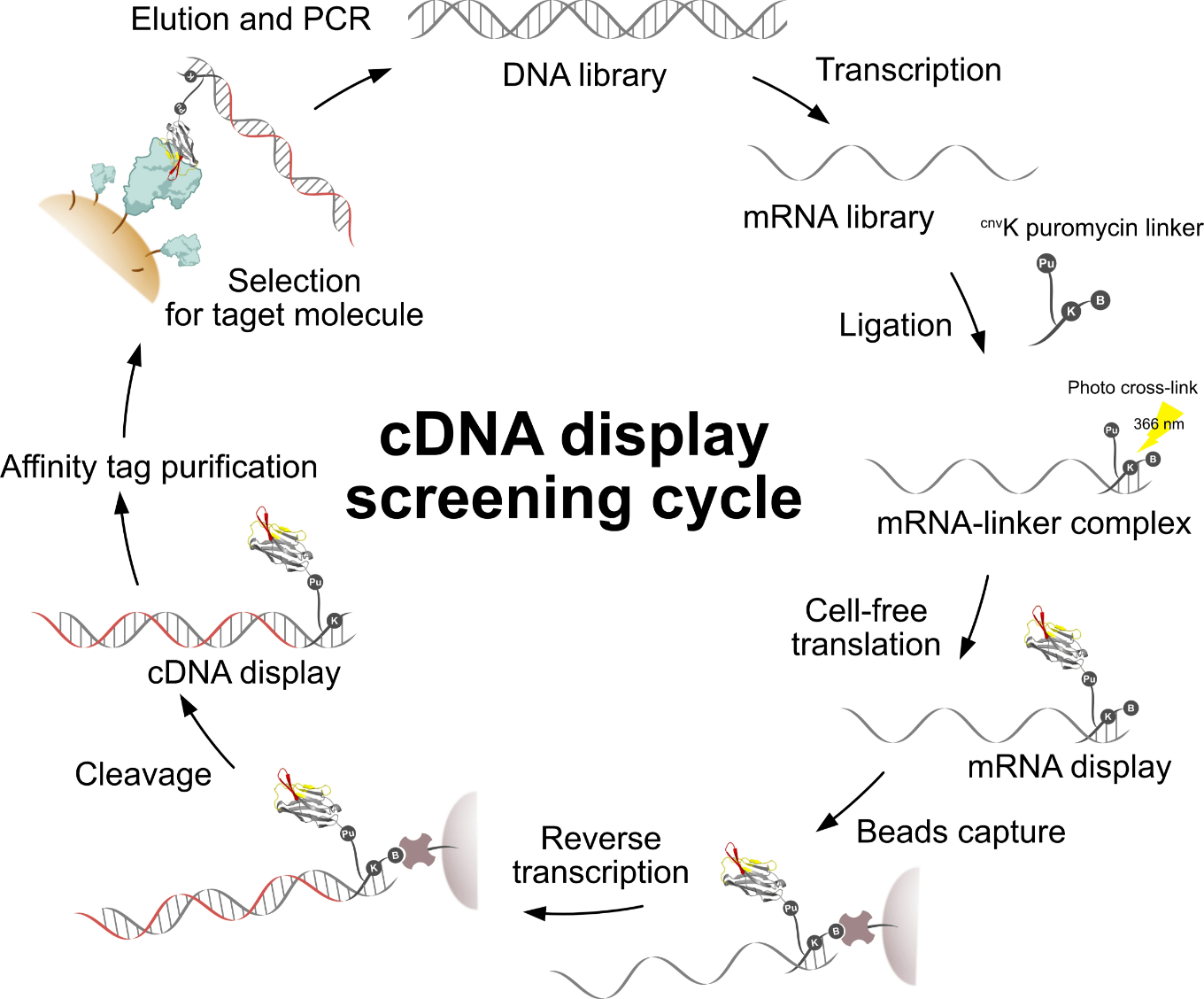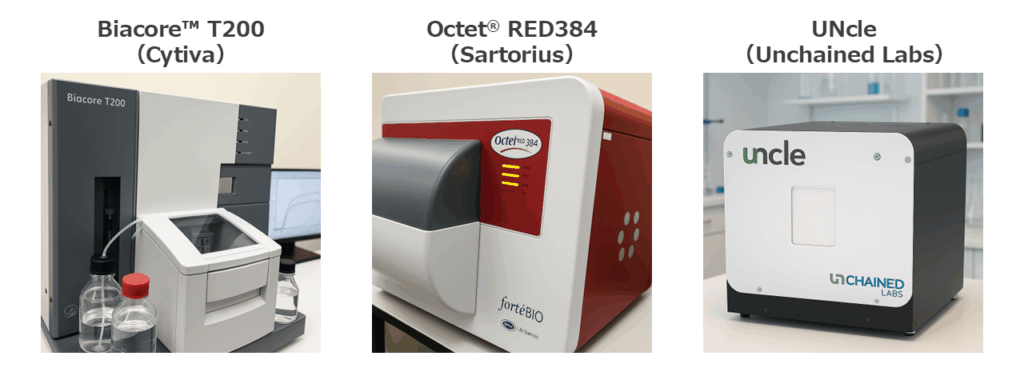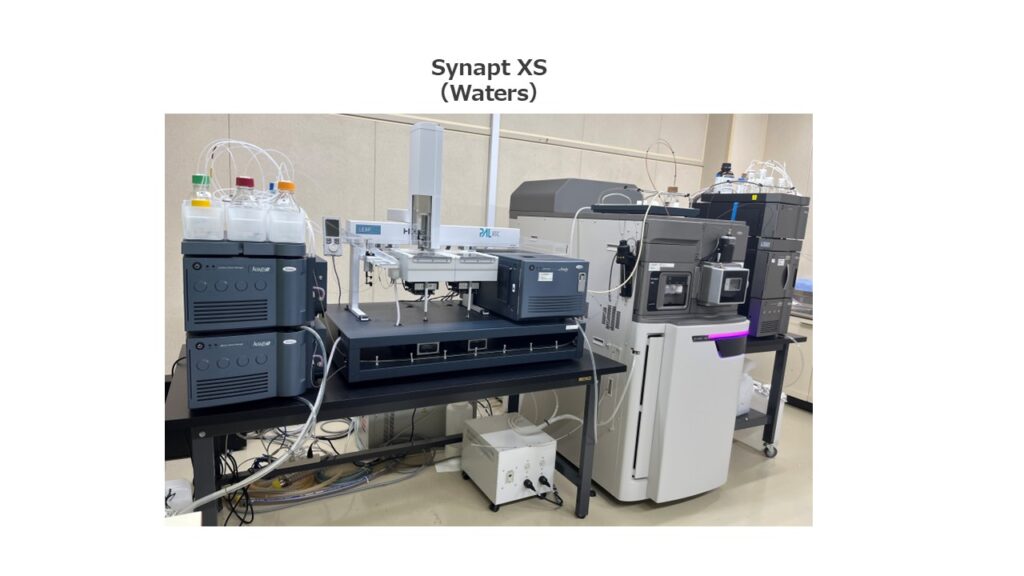High-throughput screening platform
- cDNA Display Screening
Our HTS technology is based on cDNA display which is our advanced display method cDNA display is one of the best display methods for screening because it can handle huge library size (10¹³⁻¹⁴), and select hit molecules from the library. Also, it allows us to obtain functional clones (VHH/peptides) which have high affinity.

※Cycle of cDNA Display Screening The one cycle of cDNA display screening includes synthesis of library (protein coeducated cDNA), selection of functional displayed proteins (Binding for target molecule) and amplify concentrated cDNA display molecules. Repeating these steps is important for screening hit clones which have high affinity for target molecules.
- VHH HTS screening platform
“The Month” “The Month” is our HTS platform which is the combination of PharmaLogical® Library (For more information about PharmaLogical® Library, Click here) and cDNA display method. Also, the VHH which obtained in “The Month” platform is called PharmaLogical®VHH.The advantage of this platform is that it only takes approximately a month for obtaining hit PharmaLogical®VHHs (clones have affinity) and data of stability of each hit clone. Currently, we have been utilizing this platform for both our pipelines and joint research with pharmaceutical companies. From our past research (both our pipelines and joint research), we successfully obtained hit PharmaLogical®VHHs for targets which were not able to be obtained with conventional libraries and screening methods. Also, these hit PharmaLogical®VHHs are very stable and have high affinity for target molecules.

- What “The Month” Provides you
- Amino acid sequences of Hit VHHs
- Data of binding affinity (KD) for each hit VHHs
- Data of thermal stability (Tm, Tagg) for each hit VHHs
It is also available to paid options such as cross reactivity, epitope grouping, and prediction of immunogenicity.
Please feel free to contact us here.
- Antibody Characterization We evaluate the characteristics of VHH antibody candidates obtained through screening using specialized equipment and provide the results as deliverables.
- Binding affinity evaluation(K D) We provide binding affinity evaluation data for VHH antibodies using Cytiva’s Biacore™ T200 and Sartorius’ Octet® RED384 systems. The Biacore™ T200 utilizes surface plasmon resonance (SPR) technology, while the Octet® RED384 is based on bio-layer interferometry (BLI) technology, enabling real-time, label-free analysis of antigen-antibody binding and dissociation. These systems enable high-precision evaluation of binding rate (kon), dissociation rate (koff), affinity constant (KD), and other parameters, allowing for quantitative characterization of antibody properties. Additionally, with 384-well plate compatibility, these systems offer high-throughput analysis capabilities.
- Tm, Tagg & Aggregation Analysis We offer thermal stability and aggregation evaluation services for VHH antibodies using Unchained Labs’ UNcle. UNcle is a device that combines nano differential scanning fluorometry (nanoDSF) and dynamic light scattering (DLS), enabling simultaneous measurement of protein denaturation temperature (Tm), aggregation onset temperature (Tagg), particle size, and other parameters. This service enables comprehensive quality evaluation using small sample volumes, providing valuable data for formulation development and antibody optimization.

We use the most appropriate analysis methods to accurately evaluate the characteristics of VHH antibodies after screening and provide data that is optimal for selecting candidate antibodies.
- Epitope Binning (Competition analysis between multiple clones using the BLI method) We offer epitope binning analysis services for VHH antibodies using the Octet® RED384 system. By visually and quantitatively understanding the diversity of epitopes from the numerous VHH antibody candidates obtained through HTS screening, you can utilize this information for strategic decision-making in your development plans.
- Cluster classification of antibodies belonging to the same epitope group
- Selection of non-competing antibody pairs
- Simple screening of epitope diversity when structural information is unknown
- Epitope Mapping (HDX-MS analysis) We offer an epitope mapping service using hydrogen-deuterium exchange mass spectrometry (HDX-MS) to visualize the interaction sites between VHH antibodies and target antigens. HDX-MS is a technique that detects structural changes and protected sites caused by antibody binding to antigens as mass changes, enabling high-resolution mapping of the epitope regions recognized by antibodies at the level of a few residues.
In this method, the antigen is immobilized and saturated with “antibody-A” in advance, and then “antibody-B” is added to evaluate the overlap and non-competitiveness of epitopes between different antibodies.
Combining these with our diverse collection of VHH antibodies will lead to the identification of clones with unique epitopes and the development of differentiated antibody products.
 Waters’ high-sensitivity, high-resolution mass analysis system Synapt™ XS is used, enabling precise peptide mapping and quantitative analysis of deuterium incorporation. Overlap analysis of multiple peptide fragments further improves the accuracy of epitope site identification.
Waters’ high-sensitivity, high-resolution mass analysis system Synapt™ XS is used, enabling precise peptide mapping and quantitative analysis of deuterium incorporation. Overlap analysis of multiple peptide fragments further improves the accuracy of epitope site identification.
This technology contributes to decision-making in various research and development phases, such as comparing binding sites between similar antibodies, supporting the design of bispecific antibodies, and evaluating the equivalence of biosimilars. In addition, our technical staff provides consistent support from sample preparation to measurement, data analysis, and report creation.- VHH HTS screening platform


